
Welcome back to This Week in Apps, the weekly TechCrunch series that recaps the latest in mobile OS news, mobile applications and the overall app economy.
The app economy in 2023 hit a few snags, as consumer spending last year dropped for the first time by 2% to $167 billion, according to data.ai’s “State of Mobile” report. However, downloads are continuing to grow, up 11% year-over-year in 2022 to reach 255 billion. Consumers are also spending more time in mobile apps than ever before. On Android devices alone, hours spent in 2022 grew 9%, reaching 4.1 trillion.
This Week in Apps offers a way to keep up with this fast-moving industry in one place with the latest from the world of apps, including news, updates, startup fundings, mergers and acquisitions, and much more.
Do you want This Week in Apps in your inbox every Saturday? Sign up here: techcrunch.com/newsletters
Bluesky is having a moment

Image Credits: Jose A. Bernat Bacete (opens in a new window) / Getty Images
If anyone was waiting for a winner to emerge among the many Twitter alternatives, current signs are pointing to Bluesky as a possible forerunner in the race. With its invite-only status, native mobile apps and ability to attract the always online, shitposting crowd, the app has been getting buzz this past week as users invited their friends, bringing the network to somewhere around 40,000+ users.
Bluesky today moves quickly, giving posters the dopamine rush of Twitter-level attention at times. People are vying to reach to its “What’s Hot” feed and are arguing about whether or not these pseudo-tweets should be called “posts” or “skeets” — the latter against the wishes of the CEO Jay Graber, who is begging for anything else, even “skoots.”
To what extent she’ll have any sway over the matter remains to be seen. In one viral post, Graber essentially admits the users are now running amok.

Image Credits: Bluesky screenshot
Blueskyers are also creating their own conventions for the site, dubbing the Bluesky “timeline” the “skyline,” for example, and are laughing about Elon Musk’s failures while posting their Bluesky memes.
Much of the crowd is young — ranging from Gen Z to millennial — and some have been known to joke about their plan to bully cringey Gen X’ers or any unwelcome bad actors off the app if they ever dare to join.
This experience, naturally, is not for everyone.
Despite there being a number of journalists on Bluesky, it’s so far not a place where people are sharing their work or having thoughtful discussions about the news of the day. There aren’t many (any?) right-wingers getting into arguments with leftists. There are few legit celebs or high-profile figures on board, beyond folks like Chrissy Teigen and AOC and a few others.
Instead, Bluesky feels like a weird afterparty where everyone is a little too drunk, a little too tired and has lost their filter.
This vibe may not last and neither may its appeal. It remains to be seen.
While “party Twitter” is a fun place to be for a time, it isn’t necessarily a fulfilling meal — just a sugary snack. That could leave some people returning to more robust networks, like Twitter or Mastodon to engage in more thoughtful discussions. And it may turn off some potential Bluesky users who aren’t a fan of the shitposting culture.
For others, however, a place that’s all brouhaha and no baggage may be just what they want.
There are also things the app needs to address before it opens more publicly. For now, it’s lacking many of the features people expect — like the ability to view your past likes, bookmark items, create lists, block users, use hashtags, DM others, perform advanced searches and more. This gives the network a bit of an ephemeral feeling, as posts — or skeets — quickly move down the feed, never to be seen again.
Despite its issues, Bluesky recalls the early days of the social web where trying new apps was actually fun. That’s the nature of its invite-only status, which is keeping the party small with a bouncer at the door.
In the meantime, if you want to join us on Bluesky, give us a follow.
TechCrunch team members on Bluesky include me — Sarah Perez (@sarahp), Amanda Silberling (@ralts), Brian Heater (@bheater), Frederic Lardinois (@fredericl), Romain Dillet (@romain), Matthew Panzarino (@panz), Darrell Etherington (@darrelletherington.com), Ron Miller (@ronmiller), Alex Wilhelm (@alexwilhem), Becca Szkutak (@becca), Ivan Mehta (@methology), Bryce Durbin (@dicebourbon), Henry Pickavet (@pickavet), Miranda Halpern (@mirandahalpern), Morgan Sung (@morgansung), Natasha Mascarenhas (@natashareporter) and Lorenzo Franceschi-Bicchierai (@lorenzofb).
(Those links should work when logged into the web app at staging.bsky.app. We’re all mostly on bsky.social so I didn’t write out that part of these usernames! If you have any unwanted invites, email me the codes, haha, [email protected].)
Currently, Bluesky has 245,000 downloads on iOS, more than half of which came in April, indicating there’s far more demand than there is access for the time being.
Snapchat’s My AI is getting panned

Image Credits: Snap (modified by TechCrunch)
The user reviews for Snapchat’s “My AI” feature are in — and they’re not good.
Launched last week to global users after initially being a subscriber-only addition, Snapchat’s new AI chatbot powered by OpenAI’s GPT technology is now pinned to the top of the app’s Chat tab where users can ask it questions and get instant responses. But following the chatbot’s rollout to Snapchat’s wider community, Snapchat’s app has seen a spike in negative reviews amid a growing number of complaints shared on social media.
Over the past week, Snapchat’s average U.S. App Store review was 1.67, with 75% of reviews being one-star, according to data from app intelligence firm Sensor Tower. For comparison, across Q1 2023, the Snapchat average U.S. App Store review was 3.05, with only 35% of reviews being one-star.
The number of daily reviews has also increased by five times over the last week, the firm noted.
Another app data provider, Apptopia, reports a similar trend. Its analysis shows “AI” was the top keyword in Snapchat’s App Store reviews over the past seven days, where it was mentioned 2,973 times. The firm has given the term an “Impact Score” rating of -9.2. This Impact Score is a weighted index that measures the effect a term has on sentiment and ranges from -10 to +10.
Apptopia also said that Snapchat received around 3x more one-star ratings than usual on April 20, 2023. That’s the day after the My AI global release was announced.
Many Snapchat users aren’t thrilled with My AI, which appeared inside their app without warning or their consent. For some, it’s the chatbot’s placement that’s the cause of concern. My AI is pinned to the top of users’ Chat feed inside the app and can’t be unpinned, blocked or removed, as other conversations can be. Many are also pushing back at the fact that removing the My AI from their Chat feed requires a Snapchat+ subscription — effectively forcing them to pay to get their app back to normal.
Other users found the AI creepy, as it seemed to know their location even if they hadn’t explicitly shared it.
In response to the ongoing complaints, Snap published an explainer. It said the AI would have your location data if you were already using Snap Map and if you disabled location sharing, there could be a temporary delay (due to caching, we understand) before the AI would no longer have access to that data. Snap also said it made updates to My AI that clarify when it is aware of a Snapchatter’s location, and when it isn’t. Now, when users open My AI for the first time, they’ll receive a notice explaining that it may use the information they share with Snapchat to personalize its responses.
Apple and Meta beat antitrust lawsuits; Apple’s battle was with Epic Games, Meta with state AGs
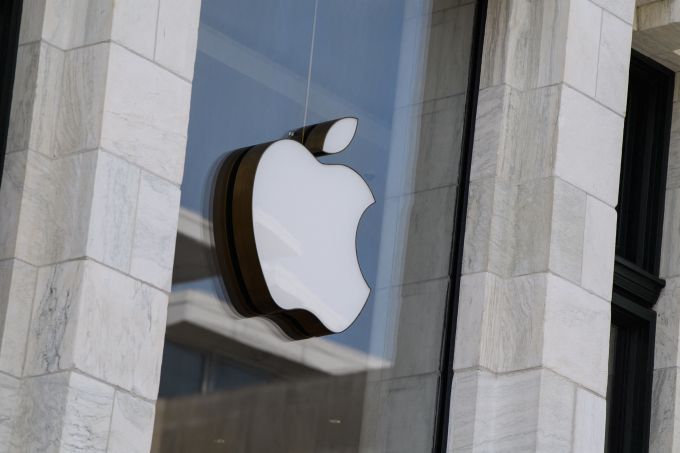
Image Credits: Nicholas Kamm / AFP / Getty Images
Apple this week won its antitrust-focused appeals court battle with Fortnite maker Epic Games over its App Store policies, according to the opinion issued today by the U.S. Ninth Circuit Court of Appeals. The court largely upheld the district court’s earlier ruling related to Epic Games’ antitrust claims in favor of Apple, but it also upheld the lower court’s judgment in favor of Epic under California’s Unfair Competition Law.
The ruling is a major setback for Epic Games and other developers who hoped the ruling could set a precedent for further antitrust claims and require Apple to open iOS devices to third-party app stores and payment systems. However, the one bright spot for developers is that the ruling upheld the lower court’s prior decision on anti-steering changes.
Noted Epic Games CEO Tim Sweeney: “Fortunately, the court’s positive decision rejecting Apple’s anti-steering provisions frees iOS developers to send consumers to the web to do business with them directly there. We’re working on next steps.”
In addition to Apple, Meta also won an antitrust lawsuit, under appeal, that had pitted the tech giant against dozens of state attorneys general, led by New York. The states alleged Meta had illegally maintained monopoly power in the social networking market through its acquisitions of photo-sharing app Instagram in 2012 and WhatsApp in 2014, and that it gained further power through data policies that harmed app developers.
The U.S. District Court Judge James Boasberg originally ruled that states had waited too long to challenge Meta’s acquisitions and that the policies they had cited were not illegal under antitrust law. The appeals court upheld this decision.
Apple
- A rumor floating around says Apple’s iOS 17 may bring changes to the iPhone Lock Screen, new features for Apple Music including lyrics on the Lock Screen, Control Center UI changes, additional Lock Screen customizations and more. The source is the same one that correctly leaked the yellow iPhone 14, so people are giving it the benefit of the doubt.
- Apple released the third betas for iOS 16.5, iPadOS 16.5 and macOS Ventura 13.4.
- Apple’s Music and TV apps were updated for Windows 11 users and support for lyrics and improved playback for songs with “consecutive lossless tracks, among other bug fixes.
- Apple is reportedly testing a system in iOS 16 to restrict features based on the user’s location, 9to5Mac says.
- The EU confirmed that Apple is one of 19 tech giants that will be subject to the Digital Services Act. This online safety and transparency legislation will apply to Apple’s App Store, specifically, and will require changes to ads, recommendations and more.
- In compliance with the Act, Apple reported its European MAUs for its App Stores, noting iOS has 101 million users, iPadOS has 23 million, macOS has 6 million, tvOS has 1 million and watchOS, Books and Podcasts have less than 1 million each.

Image Credits: Google
- Google wants developers to get ready for I/O. In a new blog post, it suggests how to get prepared by browsing the program, creating an agenda and creating your developer profile.
- Google has been testing a new Play Store ad slot ahead of its I/O developer conference in May. If rolled out publicly, the change could significantly expand the company’s Play Store search ads business by offering developers access to new prime real estate for their app marketing efforts directly on the Search tab alongside other personalized suggestions.
- In a new report, Google said it prevented 1.43 million policy-violating apps from being published on Google Play in 2022 in part due to new and improved security features and policy enhancements.
- As part of the ActivityX 1.7.0 release, Android’s Photo Picker support library will use a backported version provided by Google Play services on devices running Android KitKat (4.4) and later. The Photo Picker feature was launched last year to offer a browsable interface that presents the user with their media library, sorted by date from newest to oldest, that integrates nicely with an app’s experience without requiring media storage permissions.
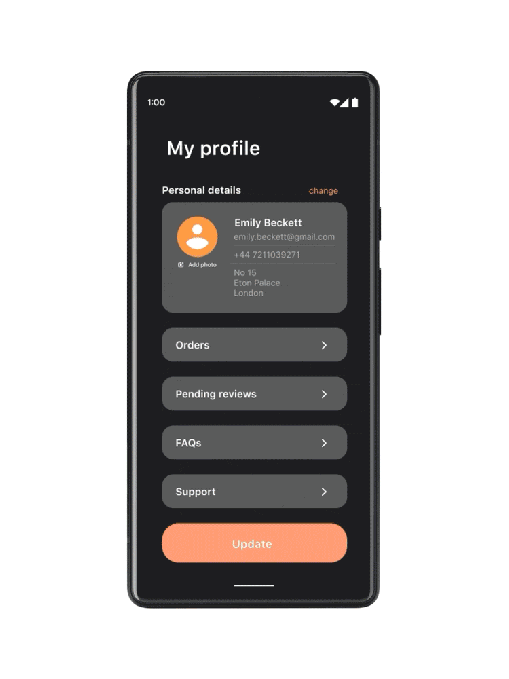
Image Credits: Google
Messaging

Image Credits: Microsoft
- iMessage is finally coming to Windows. Microsoft announced that Phone Link for iOS is rolling out to all Windows 11 customers, allowing iPhone users to make and receive phone calls, send and receive messages via iMessage, access their contacts, and see their phone’s notifications directly on their Windows PC. The feature had previously been available as an early preview to Windows Insiders.
- WhatsApp introduced “Keep in Chat,” a feature that lets recipients of disappearing messages save them with the sender’s consent. It also expanded its multi-device feature so users can access their same account across multiple phones.
- A federal court in Brazil ordered a temporary ban on Telegram after the company refused to share information about neo-Nazi groups with Brazil’s Federal Police.
Streaming & Entertainment
- Spotify announced its Q1 earnings, reporting it now has 515 million MAUs, representing a 5% increase on the previous quarter and a 22% increase on the corresponding period last year. The streamer’s Q1 revenue was up 14% YoY to €3B, ad revenue was up 17% YoY to €329M, and Premium Subscribers were also up 15% YoY to 210M.
- YouTube Music is adding support for podcasts on Android, iOS, and the web, plus support listening offline, in the background and casting for all U.S. users, with or without a Premium subscription.
- Alphabet reported during earnings that YouTube’s ad revenue fell 2.6% year over year as advertisers pulled back from the platform due to economic uncertainty. YouTube only generated $6.69 billion in advertising revenue for the first fiscal quarter of 2023 compared to $6.87 billion during the same period last year.
- Triller settled a lawsuit with Sony Music over its use of artists’ music on its platform by agreeing to pay $4.5 million.
E-commerce
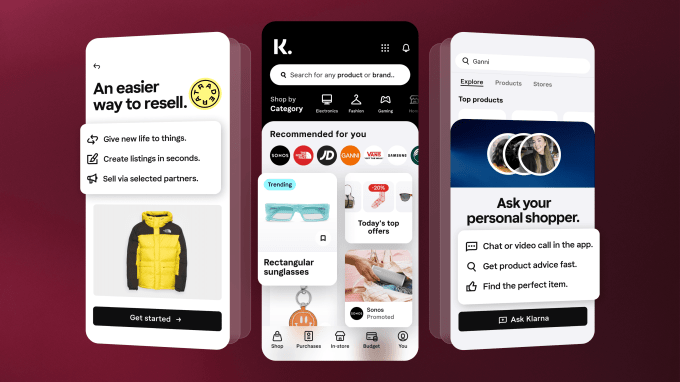
Image Credits: Klarna
- Klarna’s payments and shopping app rolled out new features to give users a more personalized shopping experience. The app now has “Ask Klarna,” a personal shopping assistant where users can speak to real fashion experts; “Creator Shops,” a customized storefront for content creators; an AI-powered discovery shopping feed; and a resell functionality.
- TikTok Shop has reportedly caught fire in Indonesia, TikTok’s second largest market, where TikTok has an estimated 110 million users. The Shop Seller app in the country has seen around 5.5 million installs.
- Instacart added a few new ways for users to find deals on its app, including a “Your Items on Sale” section on a store’s page that uses an AI recommendation system to help users find personalized deals based on their past orders. There’s also a new “Stores to Help You Save” section and more.
- Meta said it’s phasing out the onboarding of new Shops that don’t offer checkout on Facebook and Instagram. Beginning April 24, 2024, Shops without checkout on Facebook and Instagram enabled will no longer be accessible. This means that shops that direct people to an e-commerce site to complete a purchase will no longer be accessible through Meta’s apps.
- Amid earnings, Pinterest announced a multiyear strategic ad partnership with Amazon aimed at bringing more brands and relevant products to its platform. The new deal will make the e-commerce giant Pinterest’s first partner on third-party ads, and will bring Pinterest users directly to Amazon when ads are clicked on.
Fintech
- U.K.-based stock-trading startup Lightyear expanded to the web, nearly two years after emerging from stealth. Though mobile is a popular way to interact with stock trading apps, the company said web was its mostly highly requested feature.
- China’s biggest messaging app WeChat said this week it extended the use of e-CNY payments to transactions happening through its short video and mini-app platforms.
- Robinhood launched “Connect,” a feature that lets users fund their Web3 wallets without having to leave a decentralized app or be in their Robinhood Crypto account. The feature is already live with MyDoge, Giddy, and Slingshot wallets, and will support Exodus and Phantom soon.
Gaming
- Snowman, the maker of hit mobile games like Alto’s Adventure and Alto’s Odyssey, has announced its new title, Laya’s Horizon, and its launch date. The company says it’s not quite ready to share details about the game yet, but notes it’s an “entirely new IP and something we’ve been working on for a long time.” The game is due out on iOS and Android for Netflix subscribers on May 2.
Social
- BeReal claims to have 20 million DAUs and is now letting users post up to three times per day in the U.K. as part of its pilot test of a “Bonus BeReal” feature. We reported the~20 million DAU last fall, citing multiple sources, indicating the network hasn’t grown much since. Third-party data from Apptopia says the October figure was around 15 million but was down to 6 million as of March.
- Reddit hired a former Meta exec, Jim Squires, for its newly created role of EVP of Business Marketing and Growth.
- During earnings, Mark Zuckerberg disputed that Meta is shifting away from its metaverse vision, saying he sees AI and the metaverse as part of its future. Reality Labs, Meta’s department for VR and AR, lost nearly $4 billion in the quarter. Last year, it lost $13.7 billion.
- Meta says time spent on Instagram grew 24% due to its TikTok-style AI Reel recommendations. The company reported an earnings beat with Q1 revenue up 3% YoY to $28.6B, its net income down 24% YoY to $5.7B, and the “family daily active people” figure up 5% YoY to 3.02 billion for March 2023.
- Meta’s avatars are gaining new body shapes, improved hair and new clothing textures. The company also announced that more than one billion avatars have been created across its platforms.
Image Credits: Meta
- Meta also lost its head of Development and Programming, Mina Lefevre, amid layoffs. The departure came as Meta scaled back its original programming, with cancelations of most of its FB Watch Originals, including Red Table Talk.
- U.S. senators introduced a bipartisan bill that would ban kids under 13 from joining social media sites and require that tech companies get parental consent for teens’ accounts.
- Snap had a bad quarter with revenue down 7% to $989 million when analysts were expecting $1.01 billion. However, global DAUs were up 15% YoY to 383 million, close to estimates of 384 million, and its $329 million net loss was lower than expected. The stock sank 24% on the weak results.
- Clubhouse, the audio app that’s been on the downswing following the pandemic, said it was laying off 50% of its employees and will need to reset the company.
- Reddit has begun testing Discord-like chat channels with 25 subreddits that have less than 100,000 members. The company is giving moderators tools like the ability to choose who can participate in the chat, manage the chat queue and moderate reported messages in a conversation. The channels will be persistent on the community navigation bar so members can visit them frequently.
- NYC’s MTA ends its Twitter service after the Musk-run social media company demanded $50,000 per month for API access. “We want to communicate with our customers through all platforms, but we need a platform that is reliant and consistent and up to date,” MTA’s acting chief customer officer Shanifah Rieara said. As a result, the following MTA accounts will no longer offer real-time updates: @NYCTSubway, @NYCTBus, @LIRR and @MetroNorth.
- A former IRL employee alleged in a legal filing over an alleged unfair dismissal that the company inflated its user count and then retailed against him and others who raised concerns, The Information reported.
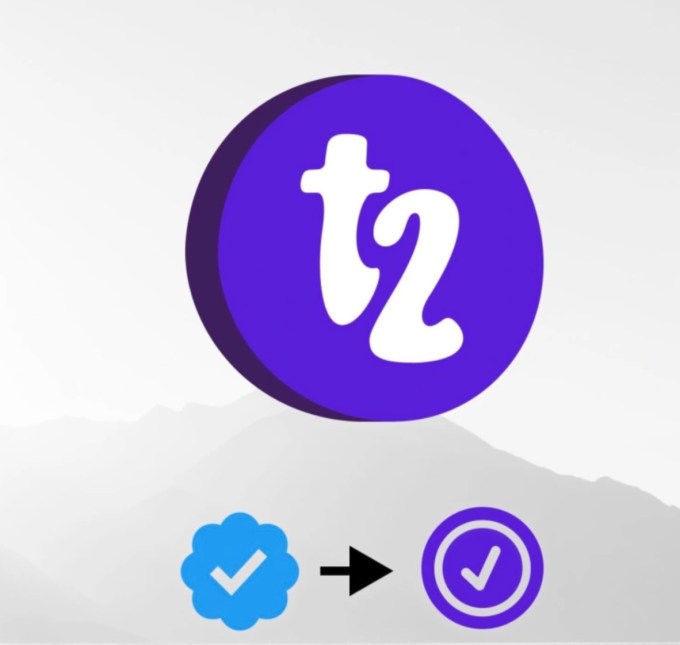
Image Credits: T2
- While Bluesky has its moment, another Twitter alternative T2 is also hoping to gain traction. The company this week readied for expansion with the launch of its invites system, aiming to grow its much smaller network of around 1,000 to at least double that if everyone invites at least one person. All users were to receive five invites, the company said. For some, the descriptions of Bluesky floating around are pushing them to try something else — shitposting is not for everyone. That could help T2 grow.
(Psst…Want a T2 invite? We have eight here. Feel free to find me on T2 as @sarahp).
AI
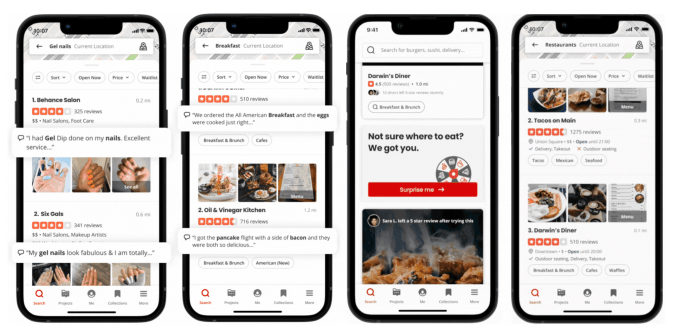
Image Credits: Yelp
- Yelp rolled out an AI-powered search experience and the ability to add videos to reviews. Thanks to the changes, Yelp says it can better understand a user’s search intent and highlight relevant information from reviews in new snippets that will appear under each business listing in search results. For video, users can now post high-resolution videos up to 12 seconds alongside their text and photos in their reviews.
- Artifact, the personalized news aggregator from Instagram’s founders, is further embracing AI with the launch of a new feature that will now summarize news articles for you. The company announced today it’s introducing a tool that generates article summaries with a tap of a button, in order to give readers the ability to understand the “high-level points” of an article before they read. For a little extra fun, the feature can also be used to summarize news in a certain style — like “explain like I’m five,” in the style of Gen Z speech or using only emojis, for example.
- Apple is reportedly working on an AI-powered health coaching subscription code-named Quartz, Bloomberg says. The coaching service would help users stay motivated to exercise, improve their eating habits and sleep better.
- TikTok is testing a feature that lets users create AI-generated profile pictures similar to Lensa’s AI app. The tool asks users to select between three to 10 photos to create their avatars, according to screenshots posted by social media consultant Matt Navarra. TikTok confirmed the test was running in “a few select regions.”
- Tinder announced a new verification process that will now use AI and video selfies to make a determination that someone is real and looks like their photos.
- Spotify’s CEO discussed AI’s progress on the company’s earnings call, describing it as both “really cool and scary,” and acknowledging there’s risk to the creative industry. “I don’t think in my history with technology I’ve ever seen anything moving as fast as the development of AI currently is at the moment,” he said.
Etc.
- Taking cues from Apple and Google, Meta announced its Meta Quest Store would now include an App Privacy tab — a new tab for product description pages “that makes it easier to understand the types of data an app or game may access — before you download it.”
- Dropbox laid off 16% of its staff or around 500 people, blaming slowing growth and the “AI era of computing.”
- Yahoo (also TechCrunch’s parent co) acquired Wagr, a three-year-old social sports betting startup based out of Nashville. Terms of the deal were not disclosed. Wagr had $16 million in outside funding, including from Greycroft, Alexis Ohanian’s Seven Seven Six and others. The deal will see Wagr integrated into Yahoo Sports and Wagr itself shutting down.
- Lookout sold its consumer mobile security business to Finland’s F-Secure in a deal valued at around $223 million, allowing it to fully embrace the enterprise business that have been its larger focus in recent years.
- Fireside, the Mark Cuban-backed interactive entertainment app, confirmed its $25 million Series A, valuing the business at $138 million, post-money. The company had been rumored to be raising at a $125 million valuation last year.
- Kakao Pay, the online payment service of South Korean tech and messaging giant Kakao, acquired a stake in Siebert Financial, a brokerage firm based in New York. Kakao spent $17 million on this transaction and the company now owns a 19.9% stake in Siebert.
Runway
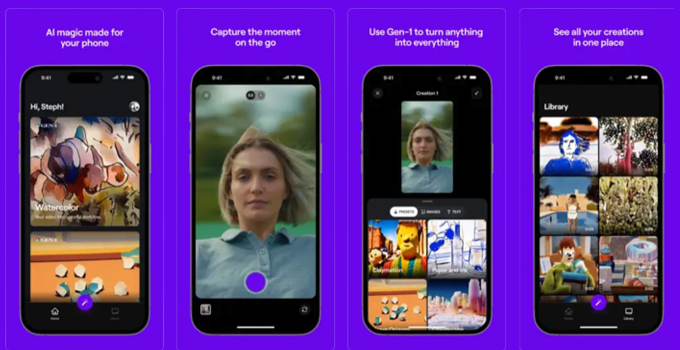
Image Credits: Runway
The AI startup Runway, which helped develop the AI image generator Stable Diffusion, launched its first mobile app this week, giving users access to Gen-1, its video-to-video generative AI model. The app allows users to be able to record a video from their phones and generate an AI video in minutes as well as transform any existing video in their library by using text prompts, images or style presets.
Plus, users can select from a list of presets like “Cloudscape,” or transform their video to look like it’s a claymation, charcoal sketch, watercolor art, paper origami and more, TechCrunch’s Lauren Forristal reported, or they can upload an image or type an idea into the text box.
The app is currently iOS-only and has paid subscriptions.
The Standard ($143.99/year) plan offers 625 credits/month and other premium features like 1080p video, unlimited projects and more. The Pro ($344.99/year) plan offers 2,250 credits/month and all of Runway’s 30+ AI tools.
Petey for iPhone
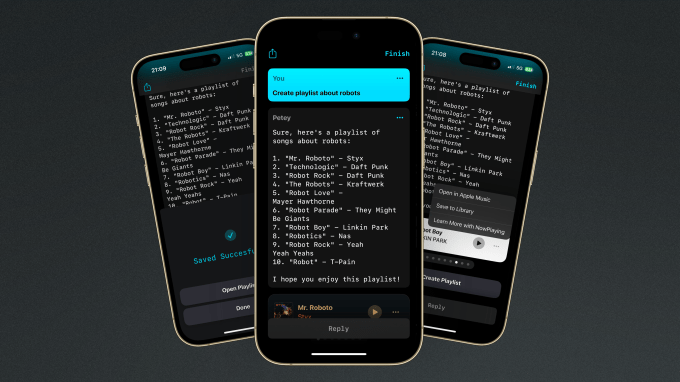
Image Credits: Petey
Petey, the mobile app that introduced ChatGPT to Apple Watch users, recently brought its feature set to the iPhone, allowing users to access its AI assistant more quickly and even swap out Siri with Petey using Apple’s Shortcuts. Now, Petey has a new trick up its sleeve. In its latest update, out today, the app can be connected to Apple Music, so it can make playlists for you or help you add individual songs to your Apple Music library.
The new feature arrives alongside several other updates, including the ability to access the latest AI model, GPT-4, through a paid “Petey Premium” subscription.
To get Petey’s music recommendations, you simply type your request for a playlist into the app’s interface.
The app then lines up short previews of each recommended song below the returned playlist allowing you to scroll through and sample each one. If you like the song, you can tap on the three-dot “more” menu next to the song to either listen to the full version in Apple Music or save the track to your Library. You can also tap the “Create Playlist” button, to give the AI-built playlist a name, then open it up in Apple Music’s app and begin listening.






